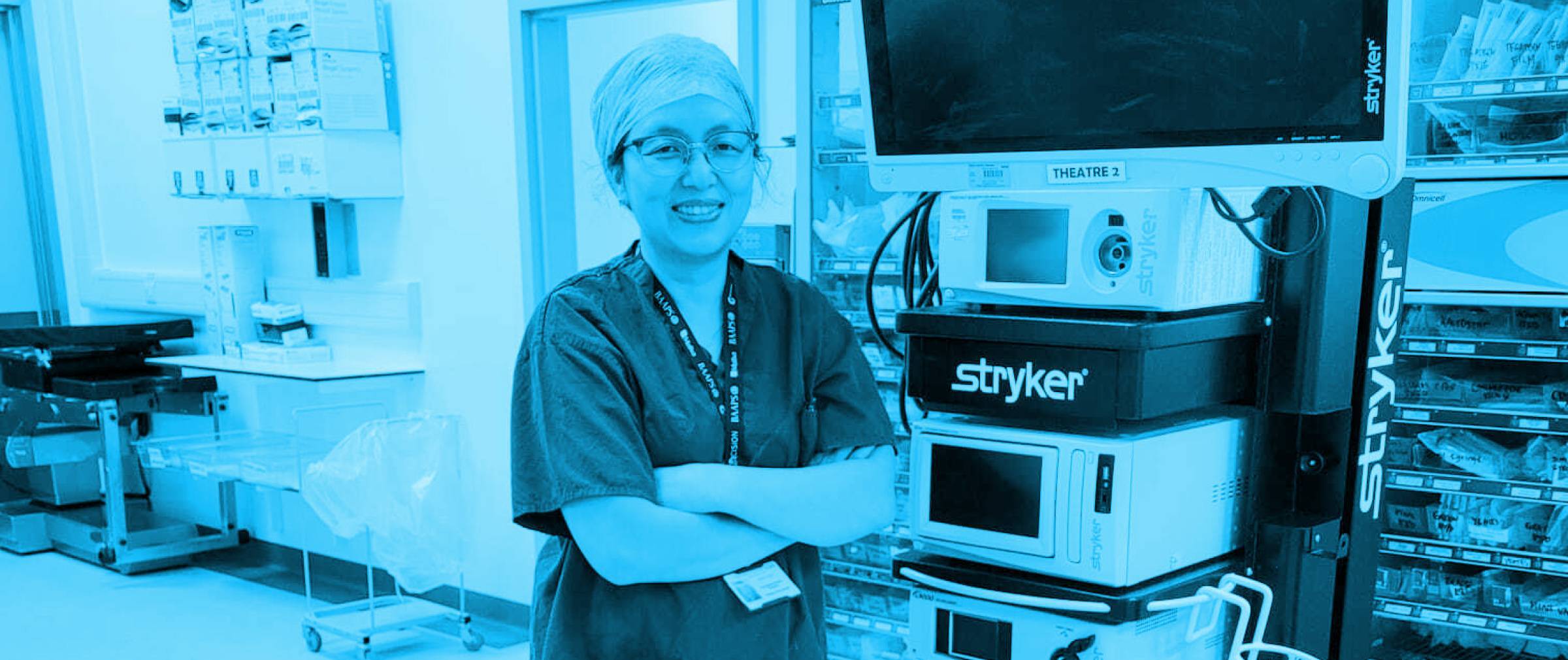

Mrs Jenny Geh joined Guy’s and St Thomas’ NHS Foundation Trust in February 2009. She is a core member of the team for specialist skin cancer treatments. She leads the plastics team for melanoma and non-melanoma cancers. She has developed a pathway for robotic pelvic dissection and 3D laparoscopic removal of skin cancers lymph nodes at the trust. She is actively involved in both national (NIHR)* and international (EORTC and MASC)*, studies for research into skin cancers.
“We started using Proximie in our teaching sessions when COVID meant that everybody had to be apart. So we carried out a trial of Proximie in small group sessions, making use of its whiteboard, photograph and video link features in both didactic and internal small group teaching."
From then on, we started using Proximie to regularly video operations – so instead of just talking to trainee surgeons about operations, we were able to do group training sessions so that a larger group of learners would be able to observe an operation at the same time or separately. NHS time provisions meant we were able to shoot the footage from an angle over the shoulder of the surgeon, which is a bit more useful for trainees than watching from the side of the theatre, as well as providing the advantage of multiple video feeds and being able to communicate with the operating surgeon using an earpiece.
We’d had a number of instances of trainee surgeons watching procedures from outside of the operating theatre using Proximie, and then a situation arose where I was having to isolate myself as a result of a COVID alert – I was perfectly well, but I was unable to attend operations in person. Because the pathway was already established, it was very easy to say to my patient: “You can have the surgery, but we’re going to do it so that I remotely guide another surgeon carrying out the procedure. Is that okay?” So it’s exactly the same as if I were there, but having to hand over to another surgeon/trainee because I need to be elsewhere – only I’m more present because I can see everything that’s going on without actually physically being in the room.
Proximie could help deal with the peaks of caseloads – to address the fact that there are some surgeries that you can’t just leave others to do, yet you can’t be in several places at the same time to carry out multiple operations. With Proximie set up, you can have more junior doctors doing remotely supervised work – essentially meaning you could carry out several procedures from your caseload simultaneously. The current teaching model means you’ve got to be in the same room as a trainee surgeon as they carry out the procedure, so you can only do one case at a time. With a surgeon remotely supervising more than one trainee at the same time, using Proximie, you can get significantly more done – as they’ve proved at Guy’s and St Thomas’ recently, with HIT (high intensity theatres) lists.
Trainee surgeons would perhaps not normally get so much hands-on experience, and many of them are happier to have the equivalent of someone being in the room with them as they carry out procedures – just so they can get real-time answers to basic questions like where to put a stitch, for example. It’s just useful sometimes to have that very literal direction – to know that you have that backup in the room. Trainee surgeons are already trained to high skill levels, but Proximie would enable further guidance to support their ongoing procedural education.
The surgical backlog the NHS is experiencing as a result of the pandemic is closely intertwined with the rate of surgical education – and trainees have been struggling to gain access to operating rooms due to the pandemic as well. But the bigger issue is simply not being able to access the expertise of trainers, and that is because of the reliance on one-to-one training. If you had more people watching – or more people carrying out procedures with remote guidance – then you are dramatically increasing the amount and speed of training taking place.
I’m really hoping for and looking forward to a future where I’m able to go in and there will be three operating theatres, and I’m in a separate room with a video feed into each of them. If any of the junior surgeons in those rooms needs anything, then – virtually – I am straight in there. Instead of it just being me gradually working through a list of patients one at a time, I would essentially be operating in three places at once – not physically, but overseeing the entirety of all three procedures in a way I just wouldn’t be able to do without Proximie.”